The fight against fakes, economic stability issues, cooperation with Ukrposhta, and reservation of journalists were the topics media representatives discussed with the leadership of the Ministry of Culture and Information Policy of Ukraine (MCIP).
Freedom of speech is an important component of the profession of a journalist, and free Ukrainian journalism can exist only if the state ensures the media the possibility of independent professional activity.
This was discussed during a press conference organized by the National Union of Journalists of Ukraine (NUJU) for the media from the front-line and de-occupied territories with the participation of Acting Minister of Culture and Information Policy Rostyslav Karandieiev. The event was held on the occasion of World Press Freedom Day. It was dedicated to the main problems that currently affect the life and work of Ukrainian journalists. Its participants were over 60 media representatives.
“What distinguishes us from hostile media is the fact that we convey the truth”
Without a doubt, the top priority of both the state and the civil sector today is the safety of journalists. As noted during the press conference, the MCIP has established a coordinating committee for the implementation of the Council of Europe campaign Journalists Matter, which records every case of obstruction of the professional activities of journalists that the Ministry has become aware of. The Ministry’s agenda includes changes regarding the insurance of journalists, including those who work in war zones. However the war creates many other important challenges.
What kind of military and humanitarian support we will have depends on how the world perceives us, Rostyslav Karandieiev emphasized. He noted that Ukrainian media understand how insidious modern information technologies are because they themselves are participants in information processes.
“However, what distinguishes us from the enemy and enemy media is that we convey the truth, and this is the strongest motivation in our work,” said Rostyslav Karandieiev.

As Lesia Chervinska, an adviser to the Minister of Culture and Information Policy, emphasized, the Ministry is ready to help journalists of front-line regional media in providing information from state authorities that is important for their audience. In particular, the press can reprint materials from the resource https://dovidka.info/. At the same time, Diana Tryma, the director of the Department of Restoration and Cultural Reintegration of the de-occupied territories of the MCIP, emphasized the importance of involving representatives of the information sphere in cooperation with the Department.
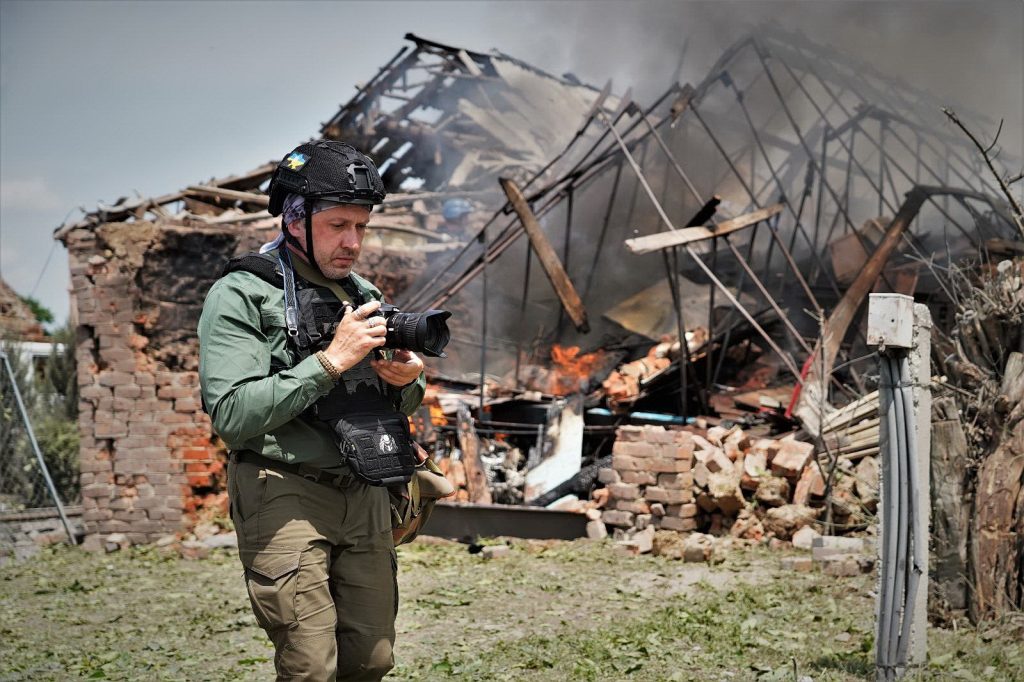
In the photo is the leading Ukrainian war correspondent, Andrii Andriyenko
(Photo taken near the city of Orikhiv, Zaporizhzhia Region)
“Social media networks do not always provide reliable and verified information”
One of the challenges for traditional media is competition from new information platforms.
“Telegram, YouTube, Facebook, and a number of other Internet resources have essentially become mass media,” stated Rostyslav Karandieiev. “Unfortunately, in the pursuit of primacy, these Internet resources do not always provide reliable and verified information. Therefore, our citizens should develop a critical perception of their messages, content, and sources of information.”
A lot has been said about the fact that anonymous channels on social networks often spread fakes and do not bear any responsibility to readers for the authenticity of information. But, as the editor-in-chief of Zaporizka Pravda newspaper and secretary of the public council of the parliamentary committee on freedom of speech, Nataliya Zvoryhina emphasized that this problem in Ukraine also has its own special dimension because the aggressor country actively spreads its propaganda through social networks.
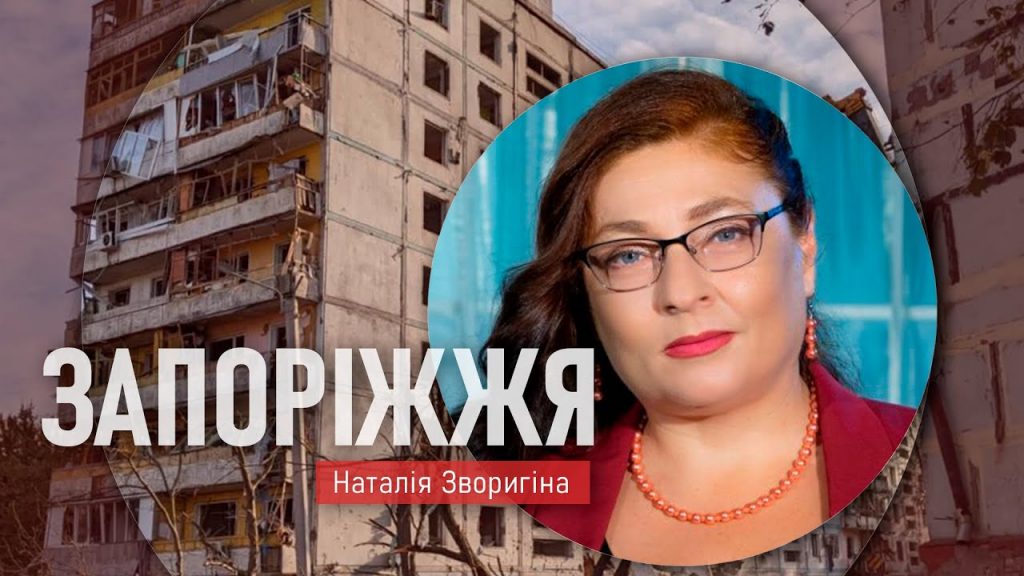
“Society discusses the necessity of the Yedyny Novyny telethon.”
Currently, society is actively discussing the telethon. The head of the MCIP noted that the state “made a conscious decision to support this all-Ukrainian channel for the dissemination of true, verified information about events in Ukraine and on the international arena.”
“Yes, the telethon is financed from the state budget, and it is not cheap because television is not a cheap business in general. But we understand that with all the wide range of mass media, such an informational marathon is important and necessary for people,” said Rostyslav Karandieiev.
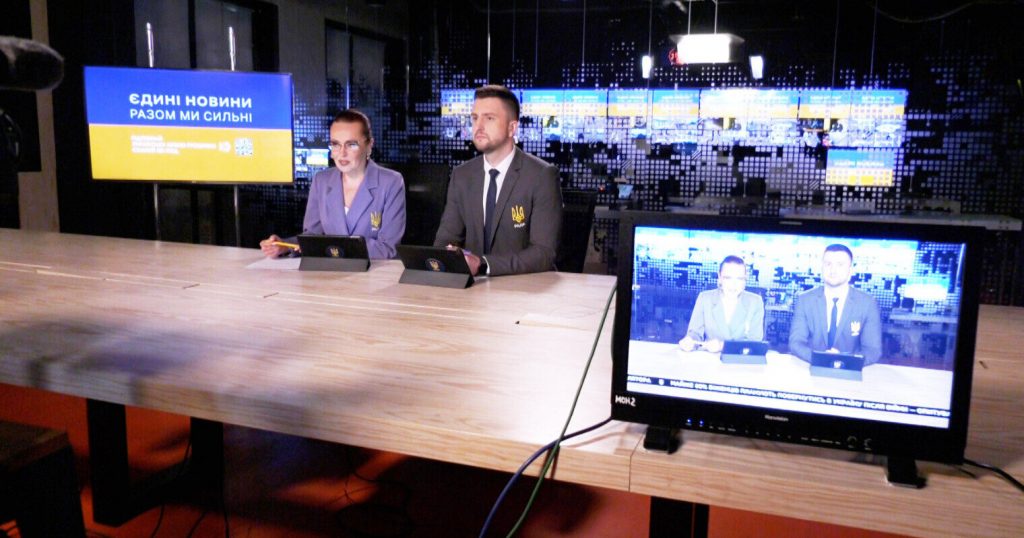
Another topic of discussion is the participation of certain TV channels in the telethon (currently, six channels work).
“Today, as part of the Yedyny Novyny project, we want to expand the regional component because regional information is really important for the average person who makes life decisions for themself,” said the minister.
At the same time, in the journalistic environment, the attitude towards the telethon is ambiguous.
“Print media subscription editions (I don’t even take retail) are larger than the telethon audience,” emphasizes journalist and media expert Serhii Cherniavskyi. “But the telethon continues to be financed because it reduces the costs of financing their TV channels for the oligarchs, and for the power structures, it is a PR opportunity. In addition, large funds are allocated to support the newsletters Government Courier and Voice of Ukraine. Can you imagine how much media could have been supported instead of printing these official newsletters?”
As the editor-in-chief of Putyvlski Vidomosti from Sumy Region, Tetiana Kaushan, added, in fact, the audience of print media, which also distributes its information on the Internet, is even larger.
“The media in the front-line territories create an information barrier that a telethon may not create,” the journalist emphasized.
“In the front-line regions, there are often no other sources of information but the local press”
The front-line newspapers, which in the ruins of their editorial offices perform a truly ascetic work – inform their audience, Ukrainians, who, in the conditions of the destruction of the infrastructure, are often deprived of access to television and the Internet – need the most support.
“These media are putting up a worthy resistance to russian propaganda and disinformation,” Sergiy Tomilenko, the President of the NUJU, emphasized.
He reminded that, as of now, the NUJU has contributed to the restoration of 32 local publications in the front-line and de-occupied territories. The last such publication is the Vechirnii Mykolayiv newspaper, the first issue of which, financed with the assistance of the NUJU, should be published in the coming days.
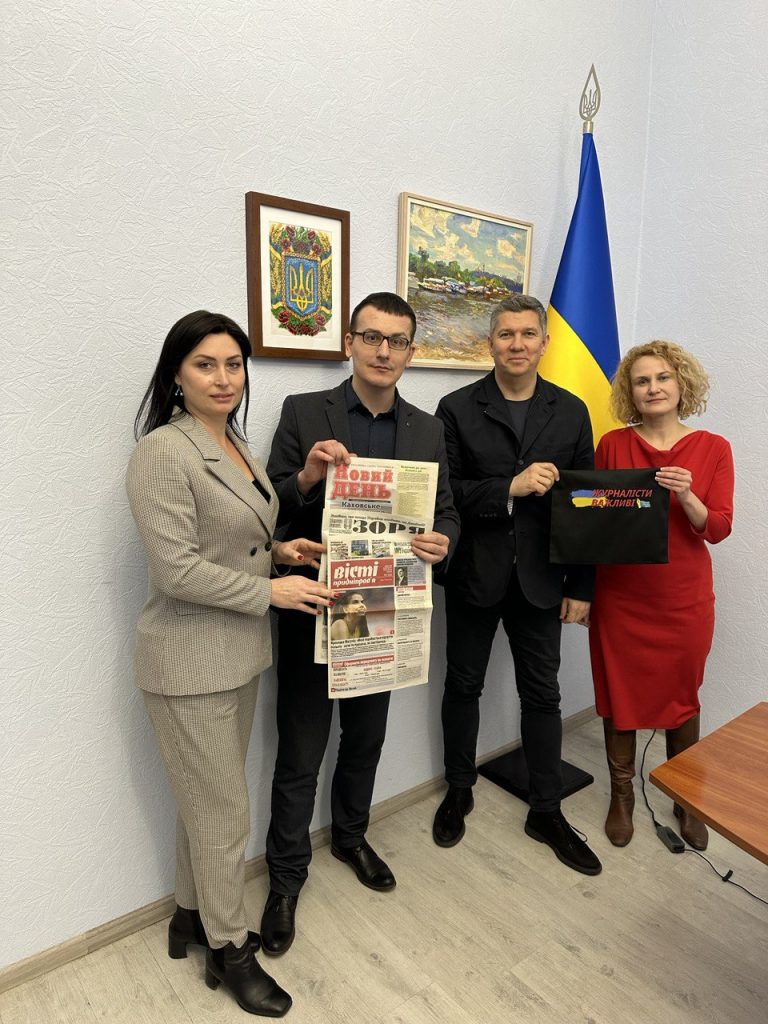
(from left to right): Diana Tryma, Sergiy Tomilenko, Rostyslav Karandieiev, Hanna Krasnostup
In turn, Rostyslav Karandieiev noted that there are often no sources of information other than the local press in the front-line and de-occupied regions, on the de-occupied territories.
“Where there is electricity, there is communication; people have modern mobile phones and computers, they can get information about events at the front and in civilian life from television and through Internet resources. However these regions often have power outages and communication cutoffs. Then local newspapers become people’s reliable assistants,” said the minister.
As Nataliya Zvoryhina, the editor-in-chief of the Zaporizka Pravda newspaper, noted, if local publications are closed, their audiences become easy prey for the russian media.
“Today, we in the front-line and border territories with russia need not only methodological, informational, and legal support, but first of all material support,” Nataliya Zvoryhina stressed. “There is practically no advertising market; subscriptions are falling (for example, 78% of the Zaporizhzhia Region is under occupation, so it is impossible to conduct high-quality subscriptions). I understand that there is no need to financially support a publication that cannot be published for objective reasons. But there are publications, such as our Zaporizka Pravda, which are fighting for their lives. I would not like to become the last editor-in-chief of the newspaper that has been published for 106 years.”
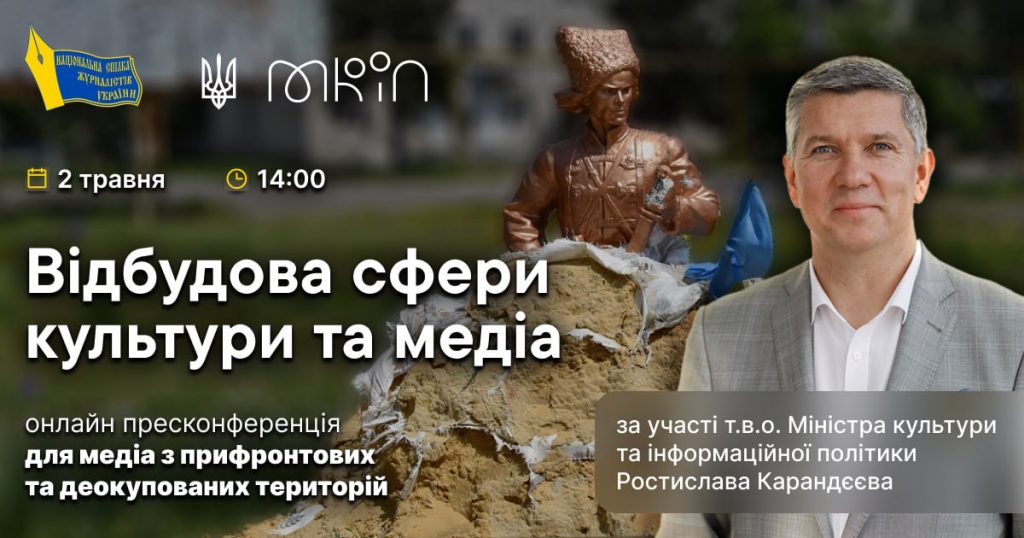
“We draw attention to the economic sustainability of Ukrainian media”
“The key idea promoted by the NUJU is the creation of the Ukrainian Media Support Fund – an institution that could follow the successful example of the Ukrainian Cultural Fund. In addition, there is a positive experience of support during the coronavirus epidemic by the Ukrainian media by the Ukrainian Cultural Fund itself. Therefore, this experience can be applied even now,” Sergiy Tomilenko noted.
MCIP representatives agreed with this and noted that they are working to ensure that the Ukrainian Cultural Fund has a separate media support program for next year.
A series of measures to restore and support Ukrainian media is being prepared by the Department of Information Policy and Information Security of the MCIP.
“We are preparing a roadmap for the restoration of a pluralistic, transparent, independent post-war media space,” said the director of the Department, Hanna Krasnostup. “This document is also important for our negotiation process with the European Union. The road map will contain measures for the restoration of subjects in the media sphere, providing them with targeted state support.”
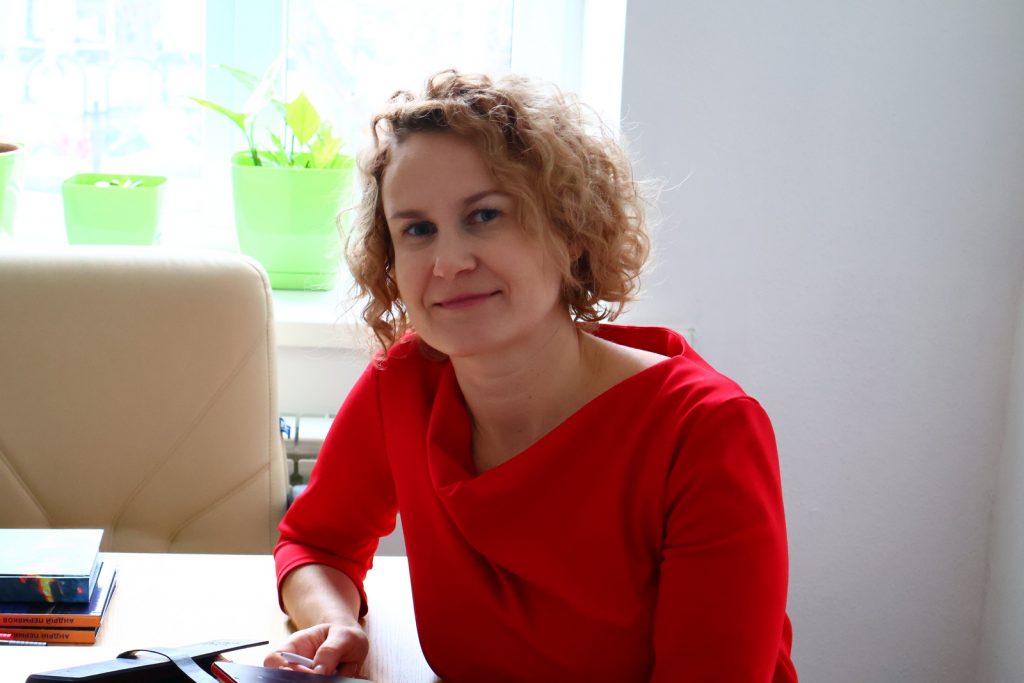
Hanna Krasnostup emphasized that it is about a wide range of media. Currently, the Ministry is studying the state of affairs in the information sphere.
According to Dmytro Klimanov, the editor-in-chief of the TELEhazeta publishing house from the Luhansk Region, these changes must take place in the near future because in case of delay, the media will be permanently lost. Russian occupiers captured Dmytro Klimanov‘s publishing house twice – in 2014 and 2022. At the same time, where Ukrainian media have not had access since 2014, people are pro-russian. In other territories, they deliberately refuse to go to war against Ukraine.
“But now all our resources have been exhausted, and we are working on enthusiasm,” stressed the editor. “If we close, we will lose journalists, audiences, and the opportunity to influence the population of the temporarily occupied territories.”
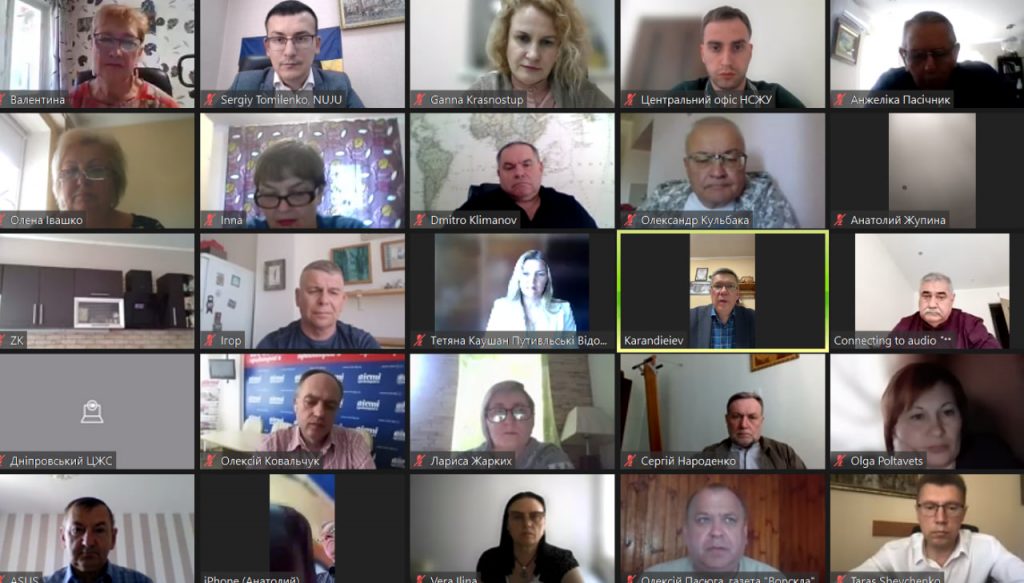
As Lina Kushch, the First Secretary of the NUJU, noted, front-line media should be restored on a level with educational institutions, waterworks, hospitals, roads, and transport. This is the principled position of the NUJU, which it promotes at all levels.
“All models of economic independence of the Ukrainian media were destroyed by the war. Despite this, in the midst of various programs for the restoration of Ukraine’s infrastructure, we do not see a single line about the revival of the media,” said Lina Kushch.
In her opinion, it is necessary to create a support fund for newsrooms, which would be filled with funds from international partners according to the principle of the government’s United24. Journalist organizations could create a coordination council and define criteria for media that are eligible for such assistance.
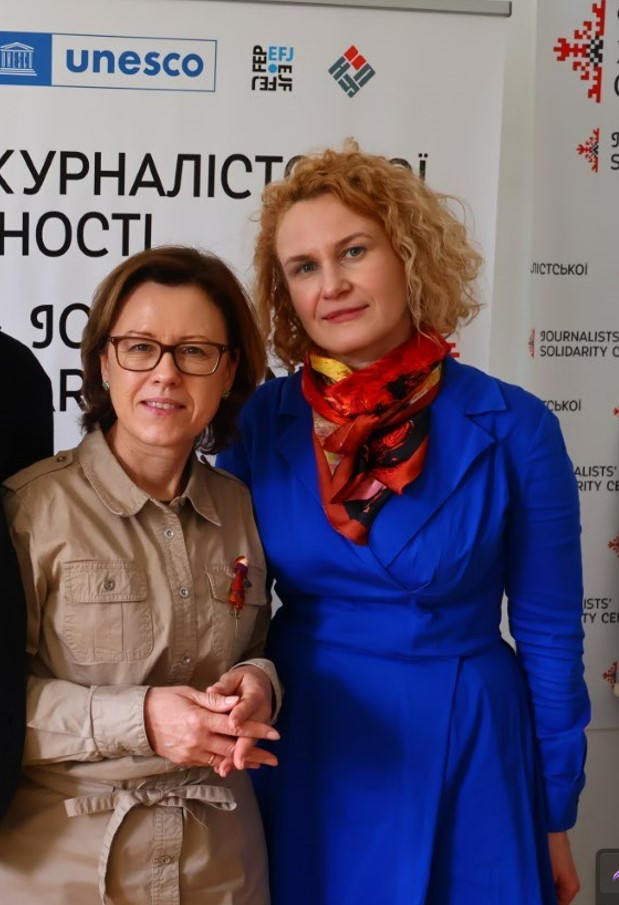
Today, when both the state and local budgets are chronically short of funds, Ukrainian media turn to foreign partners and international funds that are ready to help with grants.
“Our media, which fight for grants, act as modern projects of humanitarian policy to provide true and necessary information services to people, deserve respect,” emphasized Rostyslav Karandieiev.
He thanked the staff of the Ukrainian Institute for Advanced Training of Television, Radio Broadcasting and Press Workers (UkrTeleRadioPresInstitut or UTRPI), which works in the State Committee of Television and Radio Broadcasting, for their effective help in disseminating information about donor projects, how to apply for grants, and prepares specialists who are able to properly prepare a request for media funding.
In his turn, the President of the NUJU, Sergiy Tomilenko, emphasized that the determining role in the stability of many regional and local media, in fact, hundreds of journalists remain in the profession today, is played by international donors.
“The Union of Journalists helps hundreds of media workers through our network of Journalists’ Solidarity Centers, which is supported by the International and European Federation of Journalists, the headquarters of UNESCO,” Sergiy Tomilenko notes. “The efforts of such partners of the NUJU as the Fondation Hirondelle, IRMI, ECPMF, FPU, CRD, UMF are effective.”
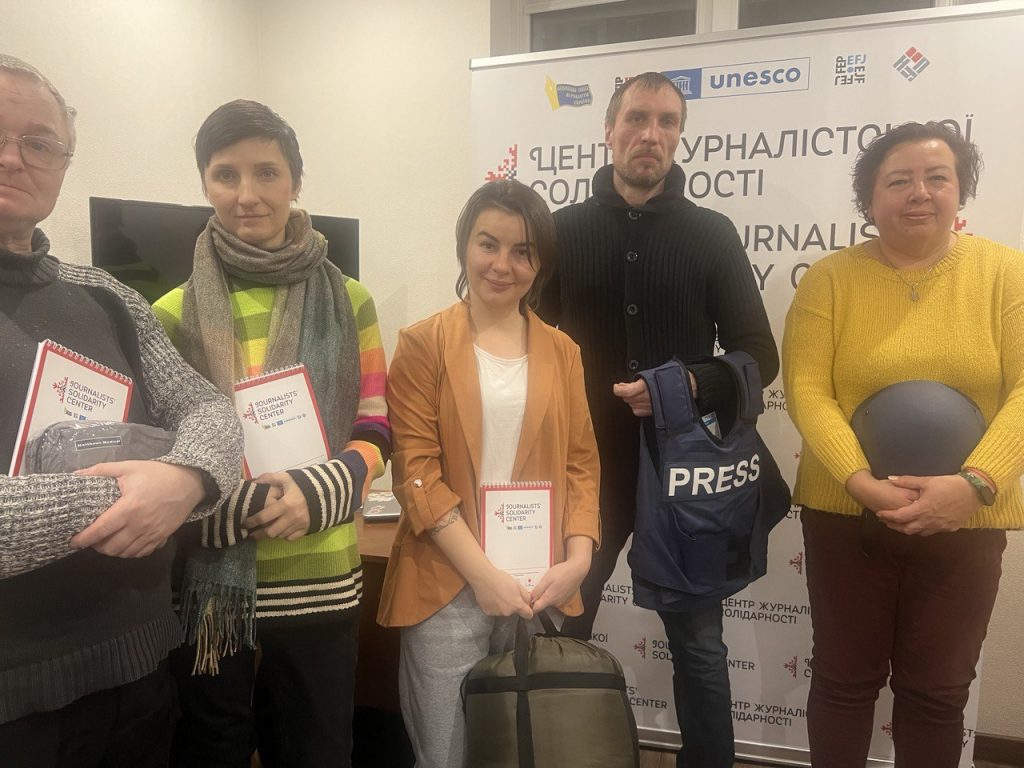
(in the center) JSC coordinator is a real front-line TV cameraman, Hanna Chernenko
“It is important to support regional press”
Rostyslav Karandieiev called the regional press “closest to the people, oriented to the local readership.”
“It is very important that publications that are trusted on the ground convey objective, truthful information about events in the region,” stressed the minister.
He thanked the National Union of Journalists of Ukraine for making it a priority to support the regional press.
“I cannot boast that the Ministry of Culture and Information Policy has such a key priority. But now, it will become one of the main tasks for both this and the next year,” promised Rostyslav Karandieiev. “Now we are forming the budget for 2025 and we already see that there are no other options but to support traditional and important for individual locations mass media… Our Ministry was not an outsider in this process before: during the two years of war, with the support of international partners, we provided assistance to several editions from Mykolayiv and some other regions of Ukraine. But we admit that the help given to five editions is not the systemic policy it should be. Therefore, we continue to work on this task and are waiting for proposals from the media community regarding forms of media support.”
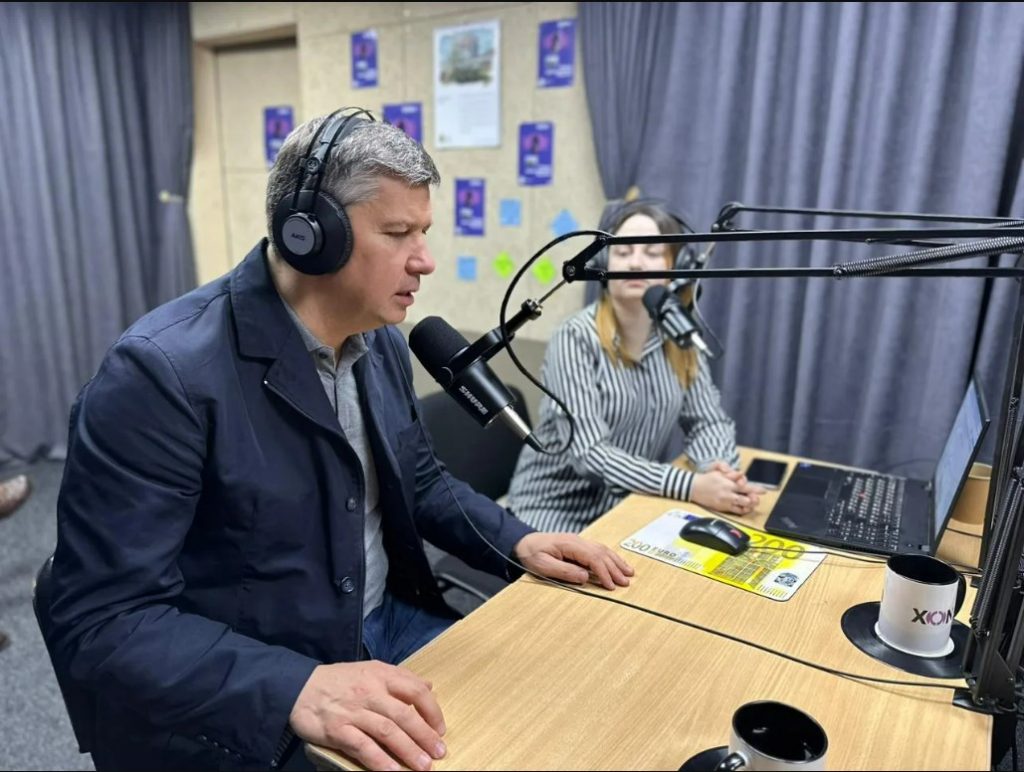
Among the projects aimed at central, national broadcasters, the MCIP plans to submit expenditures for the support of the regional press in the budget proposals for next year.
“And again, we plan to turn to donors who can help because we can’t do it ourselves,” added Karandieiev. “There are separate questions for the regional authorities, which should pay attention to the support of the regional press. In 2018, with the unsuccessful and ill-conceived reform of municipal media, we actually destroyed a huge pool of professionals and mass media that are relevant and important to the general population. We will suffer from this even today…”
“How to deliver true information to the temporarily occupied territories?”
“More than 30 of our colleagues are currently in russian captivity,” emphasized Sergiy Tomilenko. “We express full solidarity with them and do our best to achieve their release. We never tire of repeating that journalism is not a crime.”
The participants of the press conference emphasized the importance of paying attention to the informational needs of citizens living in the temporarily occupied territories.
“The challenge is not simple: how to convey true information about Ukraine to the occupied temporarily occupied territory?” stated Rostyslav Karandieiev. “The enemy is actively and quite effectively limiting the informational presence of Ukraine in these territories. The occupier controls the Internet and even satellite broadcasting, and the regional Ukrainian press, of course, does not reach the occupied territories. There is only shaky hope that there is a small spread of radio and television signals.”
According to the head of the Donetsk regional organization of the NUJU and the editor-in-chief of the Mariupol publication Pryazovskyi Robochyi, Olena Kalaitan, taking into account the information requests of the population of the occupied territories is extremely important. It is already necessary to determine how the revival of the Ukrainian media in the territories of the south and east of Ukraine will take place after their de-occupation. The importance of access to information and the media is also evidenced by the behavior of the occupiers, who immediately, after seizing the Ukrainian territories, introduced the distribution of their propaganda media there. In particular, they stole the logos and style of the newspapers Pryazovskyi Robochyi, Zaporizka Pravda, and some others and publish their propaganda leaflets under these logos.
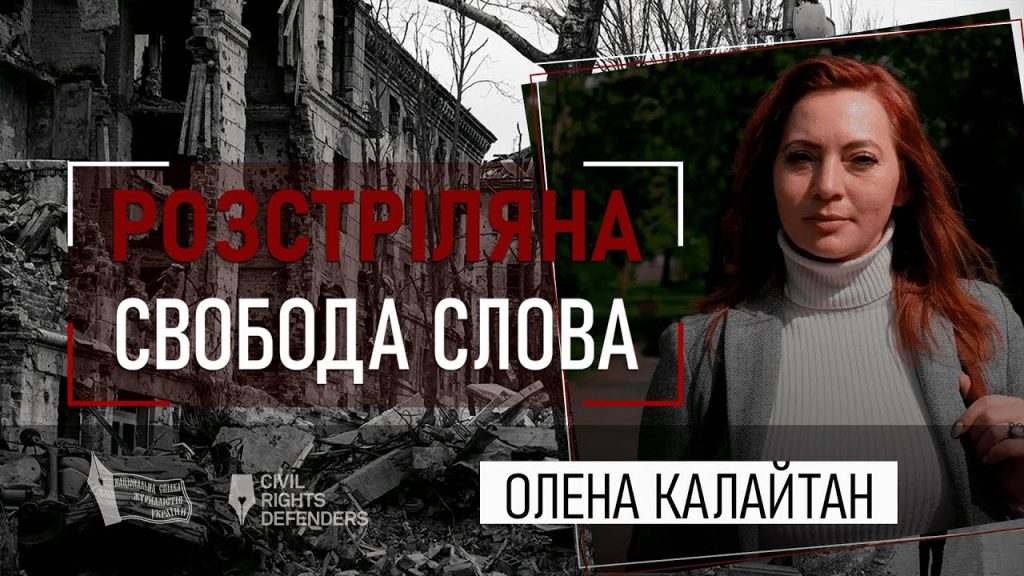
“The problem with Ukrposhta is very painful for newspapermen”
Today, there are few print media left, and those that are still left have a clear desire to develop and update themselves because otherwise, there is no chance of survival. Former newspaper newsrooms are becoming multi-platform newsrooms – in addition to the paper edition, they use the platforms of websites and social networks. This was emphasized by the head of the Dnipropetrovsk regional organization of the NUJU and the editor-in-chief of the Visti Prydniproviya newspaper, Oleksii Kovalchuk.
However, paper publications have not lost their importance, and one of their main problems is distribution.
“We would like the help of the state in solving problems with postal delivery of newspapers to subscribers,” said Oleksii Kovalchuk. “Unfortunately, the problem is becoming more and more complicated. If the community newspaper can still be distributed somehow, it is more difficult for regional newspapers. For example, there are 86 communities in the Dnipropetrovsk Region, and it is very difficult to spread circulation in all of them without Ukrposhta. We are staying afloat, but we need allies.”
According to Sergiy Tomilenko, the Union is trying to organize a dialogue between journalists and editors on the one hand and the management of Ukrposhta on the other.
“During the recent All-Ukrainian meeting of print media editors with the participation of Ukrposhta Director General Ihor Smilianskyi, we reached a certain understanding,” Sergiy Tomilenko noted. “But in fact, this is an understanding with the monopolist, who came and voiced its vision as a monopolist. As an enterprise, Ukrposhta has its own priorities. And we would like to see a state policy of supporting the press – from the point of view of creating conditions that can contribute to the spread of the Ukrainian press.”
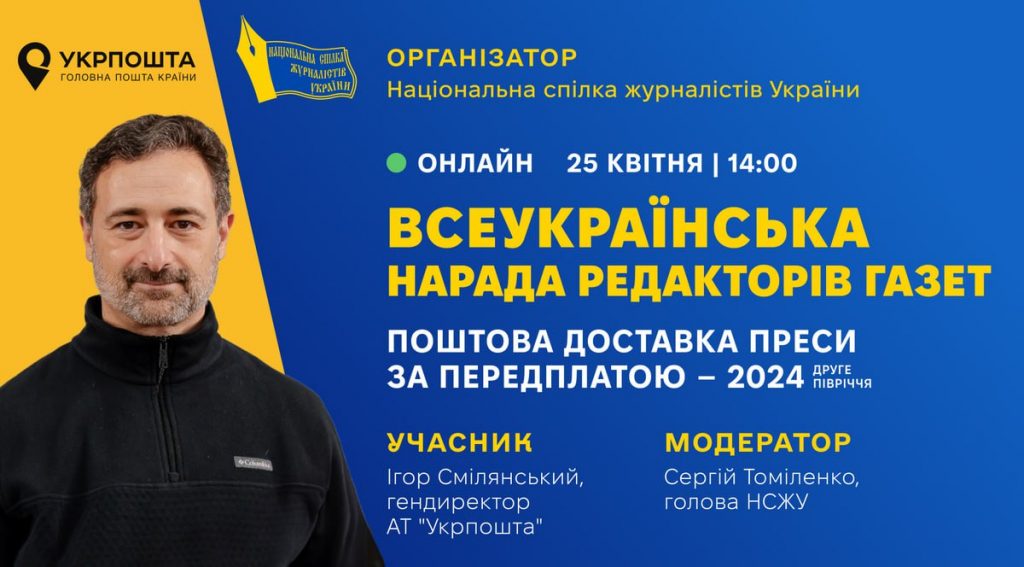
Mykola Semena, a NUJU secretary, stated that today, Ukrposhta unfortunately does not fulfill its social role. The situation is such that Ukrposhta is losing competition to other delivery services in the actual postal function while it is eliminating itself from the function of delivering the press. Therefore, newsrooms often have to deal with the distribution of their newspapers on their own.
“Ukrposhta takes care of the business that does not belong to it (for example, the distribution of medicines) while not performing its own functions,” Mykola Semena believes.
According to Anatolii Zhupyna, the editor-in-chief of the Kherson newspaper Novyi Den, russian occupiers report opening 500 russian post offices in the temporarily occupied territory of the Kherson Region.
“My proposal is to hold a joint meeting of representatives of the Ministry of Culture and Information Policy, the National Union of Journalists of Ukraine, and “Ukrposhta,” said Anatolii Zhupyna. “Perhaps, in such a joint discussion, it will be possible to develop an action plan to correct the situation with the delivery and subscription of local publications. This will be especially necessary and important for the de-occupied territories.”
“If the only journalist is mobilized [to the army], the publication will close”
An important problem of publications is the conscription of journalists for military service. In many media, men of conscription age are the basis of the team or even the only journalist.
“For example, the Mezhivskyi Meridian newspaper staff are three people, a forty-year-old man and two women of retirement age. In addition to the paper edition, they also fill the website and social networks. Suppose the man is drafted into the army. In that case, the publication will be closed,” says the head of the Dnipropetrovsk regional organization of the NUJU, Oleksii Kovalchuk. “The situation is the same in many other local media, where one man often plays the role of a journalist, editor, driver, and cameraman.”
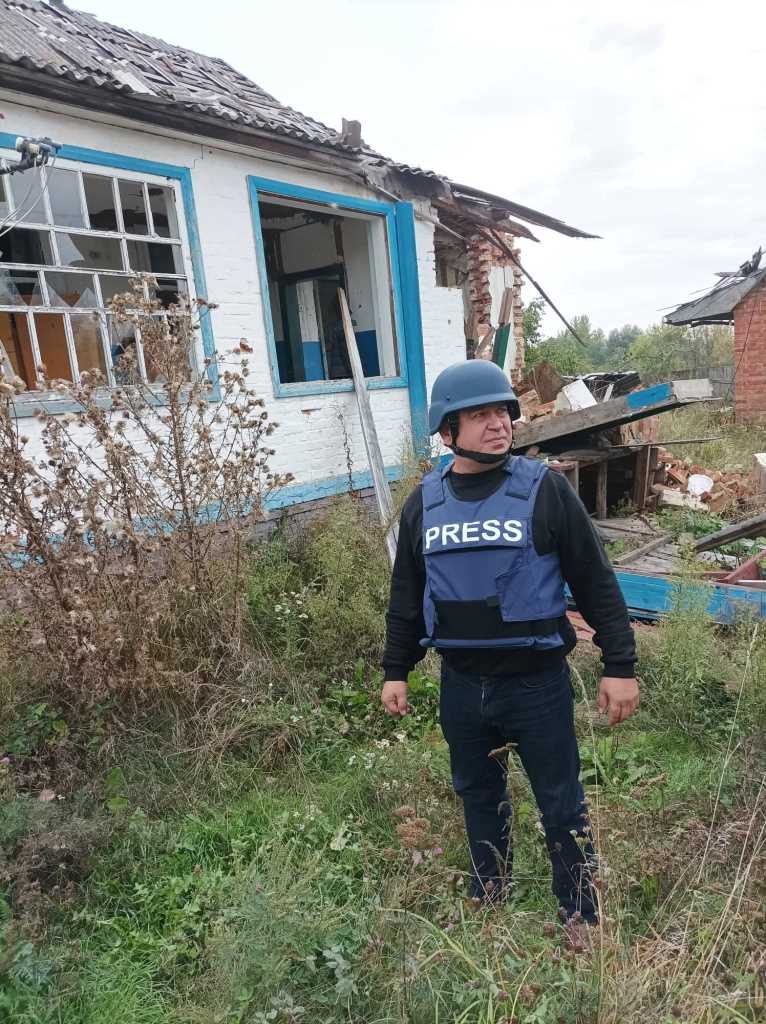
Oleksii Pasiuha, the editor-in-chief of the Vorskla newspaper from the border town of Velyka Pysarivka, Sumy region, said that when he received a summons and asked a retired colleague if he could replace him as editor, the colleague refused. In particular, due to the fact that the circulation will have to be transported to a 5-kilometer zone close to the border with russia.
“This situation, in fact, is typical for many publications: if we do not receive a certain postponement (at least for a while until we find a replacement), the newsrooms will cease to exist,” said Oleksii Pasiuha. “We are fighting for the preservation of our publication. Now, we are looking for a new office where we can make a video studio (because the previous premises were damaged). However, this will all stop the moment I am mobilized.”
According to Hanna Krasnostup from the MCIP, unfortunately, today, you can book a journalist only if the newsroom meets a number of criteria. Most Ukrainian media do not meet these criteria. But the Ministry of Economy is currently working on amendments to these rules, and the MCIP, for its part, will do everything to ensure that media people are booked.
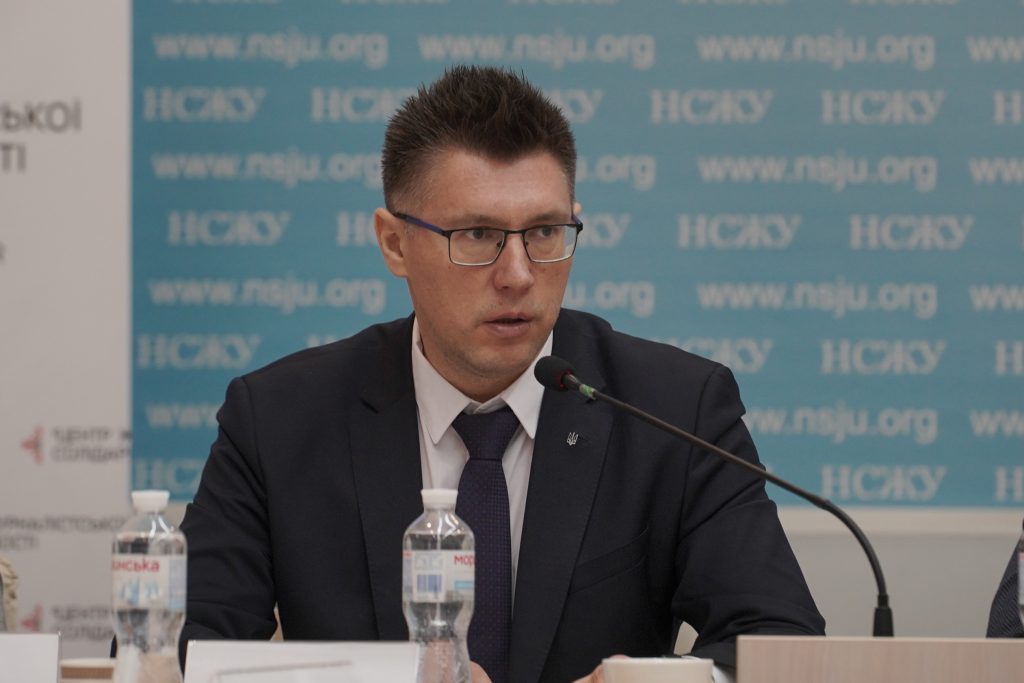
During the press conference, Deputy Minister of Culture and Information Policy Taras Shevchenko noted that media activity and freedom of speech are important for Ukraine not only for internal reasons but also as an important marker of our country’s readiness to join the European Union. At the end, he added:
“Informing citizens, responsible journalism, as well as responsible consumption of information by people is what brings our victory closer!
It is important to support the media in the regions – the results of the 16th meeting of the MCIP and NUJU!“
The meeting of the leadership of the MICP with front-line media journalists was held at the initiative of the leadership of the NUJU. The participants in the event were over 60 media persons, mainly from Kherson, Zaporizhzhia, Dnipropetrovsk, Kharkiv, Sumy, Mykolayiv, Chernihiv, Luhansk, and Donetsk Regions.
NUJU Information Service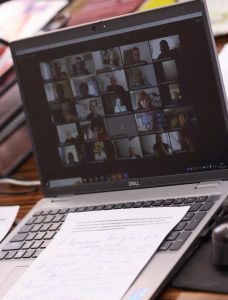

 THE NATIONAL UNION OF
JOURNALISTS OF UKRAINE
THE NATIONAL UNION OF
JOURNALISTS OF UKRAINE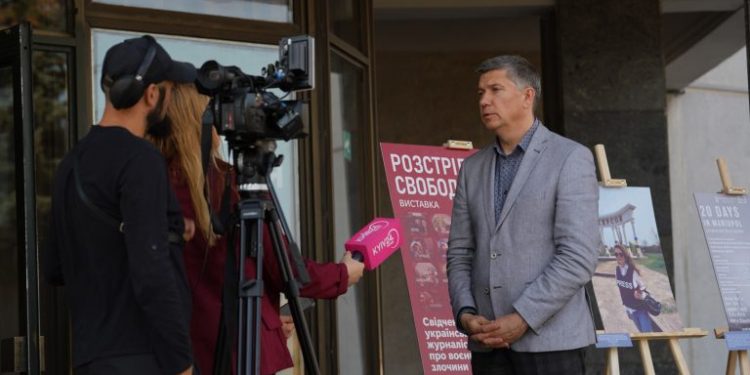
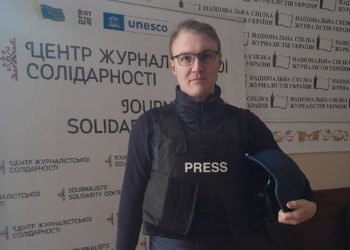

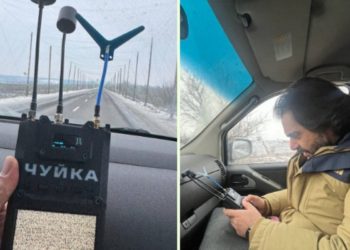













Discussion about this post